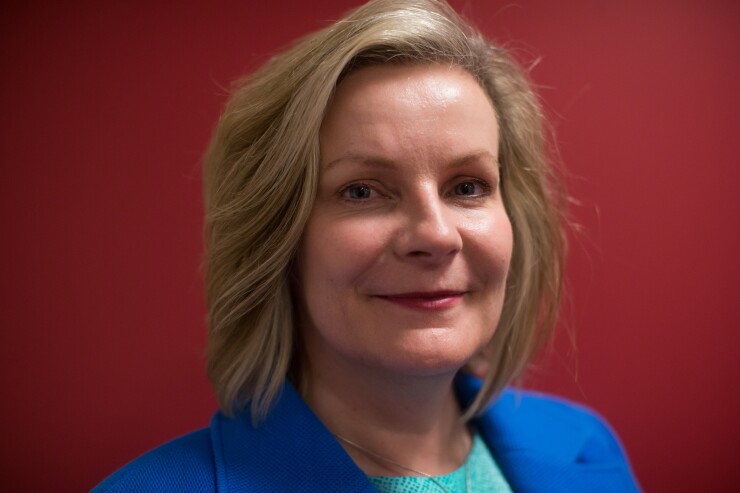HSBC is getting aggressive in Canada — and one needs to look no further than its latest mortgage rate for proof of broader ambitions.
HSBC Canada is offering five-year fixed-term mortgages at 2.39 percent, undercutting the lowest discretionary rates at the largest domestic lenders including Toronto-Dominion Bank and Royal Bank of Canada.
"I want to be more competitive," Sandra Stuart, chief executive officer of the Canadian unit of London-based HSBC, said in an interview from her Vancouver office. "I will never be as big as the Big Five, but I certainly want to have our share of market, and I want to be out there with good competitive products."
The mortgage push is part of Stuart's strategy to expand HSBC Canada across its main businesses of commercial lending, capital markets, retail banking and wealth management. Stuart, who became head of the Canadian operations in June 2015, won the backing of HSBC, which she said has made a fourfold increase in annual investment in the Canadian operations to gain market share.
"HSBC globally is making a big bet on Canada, and they're investing in us to do that," Stuart said. "There's a handful of priority markets that are going to get continued investment and our job is to develop the strategy, to execute and of course deliver the returns."
Shares of HSBC have climbed 1.5 percent this year in London trading, trailing the 4.5 percent advance of the 12-company FTSE All Share Banks Index.

HSBC has been in Canada since 1981, expanding through takeovers of domestic lenders and the Canadian operations of foreign banks to become the seventh-largest lender in the nation with C$95.7 billion ($71 billion) in assets. Commercial banking accounts for 60 percent of the firm's Canadian profit, while its global banking and markets operations contribute 30 percent and retail banking and wealth management represent 10 percent.
"Canada is a great place to do business," Stuart said, citing the nation's growing economy, geographic stability and international trade ties that dovetail with HSBC's global reach. "Canada is the No. 2 export partner for the U.S. and we've got the gateway to the Pacific, and we've got a real focus now on China, a great corridor with Hong Kong. We're really well positioned."
The Canadian operations are a "Top Five" producer of profit before taxes, contributing 7.6 percent of total earnings for Europe's biggest bank last year, up from 4.4 percent in 2015. HSBC Canada had profit before tax of C$715 million last year and revenue of C$2 billion.
HSBC Canada is revamping its operations, spending more to update technology and rolling out new offerings for customers. Stuart, 53, added 60 commercial bankers in the last year and aims to hire up to 40 more by year end to the division's 1,000-strong workforce. In investment banking she's added a dozen professionals in the past 12 months to lift staffing levels to about 180 people. She's repositioned the firm's retail and wealth offerings to draw a broader clientele of Canadians to compete with the other big banks.
"We're an international bank in the country and we have to compete on that basis, but we have to be good competition for any bank in the country — whether it's the Big Five or a small regional player here in the west," Stuart said. "Our job is to compete and to do that, you have to be certain that your product offerings are competitive, and what's the right market share for you."
On retail banking and wealth, which has about 2,400 employees, HSBC has made some key changes. Last October, the lender recruited Larry Tomei, a 22-year veteran from Canadian Imperial Bank of Commerce to head up the business. The bank, which previously targeted a more affluent clientele for its mortgages, has "broadened its strategy" to woo a broader range of customers leading with that mortgage offering, according to Stuart.
"HSBC has had market-beating rates for over a year now," said Rob McLister, founder of the mortgage comparison website RateSpy.com. "HSBC is on a market share binge."
HSBC is looking to tap into new customers by opening more branches in cities including Vancouver, Montreal and Toronto within the next 12 months, adding to its current network of 129 locations across the country.
"They won't be the big heavy branches with a vault," she said. "There'll be a couple of ATMs, a place to get cash, someone to help you get a mortgage, there'll be wifi, computer terminals and it'll be more digital, and it'll be a smaller footprint."
She's even open to the idea of acquisitions.
"If there was something that made sense for us, we'd be open to it," Stuart said. "There's not too much out there to buy, but if a portfolio became available or something made sense for us, we'd absolutely take a look at it."
That doesn't include looking at Home Capital Group Inc., the struggling mortgage lender facing a run on deposits.
"This isn't something for us right now," she said.





